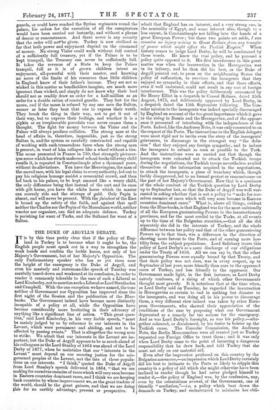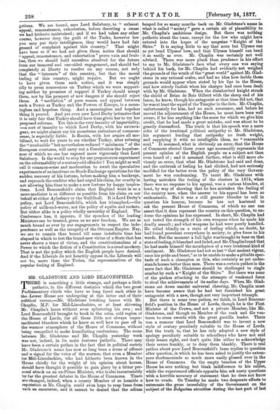TILE DUKE OF ARGYLL'S DEBATE.
IT is by this time pretty clear that if the policy of Eng- land in Turkey is to become what it ought to be, the English people must speak out in a way to strengthen the weak hands and confirm the feeble knees, not only of her Majesty's Government, but of her Majesty's Opposition. The only Parliamentary speaker who has as yet risen near the height of the emergency is the Duke of Argyll, and even his masterly and statesman-like speech of Tuesday was carefully toned-down and weakened at its conclusion, in order to render it commonly tolerable to the ears of such a Liberal as Lord Kimberley, not to mention such a Liberal as Lord Stratheden and Campbell. With the one exception we have named, the tone neither of Government nor Opposition has improved since the first night of the Session and the publication of the Blue- books. The Government indeed have become more distinctly incapable of a policy at all, while the Opposition have become considerably more hesitating in their advocacy of anything like a significant line of action. "This great ques- tion," said Lord Kimberley, in his very feeble speech, "must be mainly judged by us by reference to our interests in the Levant, which were permanent and abiding, and not to be affected by passing events." That is altogether the wrong note to strike. We admit that our interests in the Levant are im- portant, put the Duke of Argyll appears to be as much ahead of his colleagues as the Lord Stanley of 1864 was ahead of the Lord Derby of 1877, when he maintains that our "interests in the Levant" must depend on our securing justice for the mis- governed peoples of the Levant, not the fate of those popula- tions on our interests. "I think," quoted the Duke of Argyll from Lord Stanley's speech delivered in 1864, "that we are making for ourselves enemies of races which will very soon become in Eastern countries dominant races, and I think we are keeping back countries by whose improvement we, as the great traders of the world, should be the great gainers, and that we are doing this for no earthly advantage, present or prospective. I
admit that England has an interest, and a very strong one, in the neutrality of Egypt, and some interest also, though to a less extent, in Constantinople not falling into the hands of a great European Power ; but these two points set aside, I can conceive no injury arising to Great Britain from any transfer of power which might affect the Turkish Empire." When history comes to judge Lord Derby, he will be condemned by these words. He knew the true policy, and he pursued a policy quite opposed to it. His first interference in this great matter was when the insurrection in the Herzegovina was in its infancy, and he then did his best, as the Duke of Argyll pointed out, to press on the neighbouring States the policy of suffocation, to convince the insurgents that they enjoyed no sympathy in their efforts, and that those efforts, even if well sustained, could not result in any sort of foreign interference. This was the policy deliberately announced by Sir Henry Elliot in a despatch to Consul Holmes, dated 25th August, 1875, and deliberately approved by Lord Derby, in a despatch dated the 15th September following. The Con- sular mission to the insurgents was indeed specially discouraged by England on account of the too great importance which it gave to the rising in Bosnia and the Herzegovina, and of the appear- ance it presented of interfering with the independence of the Porte. Indeed, like the Andrassy Note, it was only consented to on the request of the Porte. The instructions to the English delegate were most rigid not to invite even the story of the insurgents' grievances, to discourage in the strongest way "the delu- sion" that they enjoyed any foreign sympathy, and to induce the insurgents to submit as soon as possible to the Turk. And the instructions were so carried out that though the insurgents were exhorted not to attack the Turkish troops during the negotiations, the Turkish troops nevertheless availed themselves of the information acquired in the negotiations, to attack the insurgents, a piece of treachery which, though feebly disapproved, led to no formal protest or remonstrance on the part of her Majesty's Government. Now that is a specimen of the whole conduct of the Turkish question by Lord Derby up to September last, so that the Duke of Argyll was well war- ranted in asking whether that is not a policy to "make for our- selves enemies of races which will very soon become in Eastern countries dominant races." What is, above all things, evident from the Blue-books, is that England was far the most unfriendly of all the European guaranteeing Powers to the insurrectionary provinces, and far the most cordial to the Turks, at all events up to the time of the Bulgarian atrocities,—that all she did separately she did in the interests of Turkey, and the whole difference between her policy and that of the other guaranteeing Powers up to that time, was a difference in the direction of showing more favour to the Porte, and of earning more hos- tility from the subject populations. Lord Salisbury treats this policy of Lord Derby's as a mere discharge of our obligations under the Treaty of 1856. All we can say is, that the other guaranteeing Powers were equally bound by that Treaty, and that their policy was not ours, was in every respect, up to September of last year, more friendly than ours to the oppressed races of Turkey, and less friendly to the oppressor. Our Government made light, in the first instance, as Lord Derby naively confesses, of a rising of which other Governments thought most gravely. It is notorious that at the time when, as Lord Derby said on Tuesday, he regarded the insurrection in Herzegovina as certain to end in nothing but disaster to the insurgents, and was doing all in his power to discourage them, a very different view indeed was taken by other Euro- pean Governments, who showed their appreciation of the conditions of the case by proposing what our Government deprecated as a remedy far too serious for the emergency. And as was Lord Derby's foresight, so was his policy,—alto- gether coloured, or discoloured, by his desire to bolster up the Turkish cause. The Consular Commission, the Andrassy Note, the Berlin Memorandum were all treated just as Turkey requested our Foreign Office to treat them ; and it was only when Lord Derby came to the point of incurring a dangerous responsibility that he drew back, and told Turkey that she must not rely on our material aid. Even after the impression produced on this country by the Bulgarian massacres,—an impression which Lord Derby certainly did his best to intimate to the Porte as likely to cripple this country in a policy of aid which she might otherwise have been inclined to render though he had never pledged himself to render it,—the policy of England was, by the confession, nay, even by the ostentatious avowal, of the Government, one of friendly "mediation,"—i.e, a policy which beat down the demands on Turkey, and endeavoured to minimise her obli-
gations. We are bound, says Lord Salisbury, to " exhaust appeal, remonstrance, exhortation, before deserting a cause we had hitherto maintained ; and if we had taken any other emu, however deep the guilt of the Turks, however low you may put their intelligence, they would have had fair ground of complaint against this country." That might have been so if we had not given them notice that should "appeal, remonstrance, and exhortation" prove vain and fruit- less, then we should hold ourselves absolved for the future from our immoral and one-sided engagement, and should feel completely at liberty to resolve on any course, not only that the " interests " of this country, but that the moral feeling of this country, might require. But we ought to have given them such notice, and it was simply silly to press concessions on Turkey which we were support- ing neither by promises of support if Turkey should accept them, nor by the prospect of new dangers if she should reject them. A "mediation" of pure reason and appeal between such a Power as Turkey and the Powers of Europe, is a mean- ingless and hopeless thing. And a meaningless and hopeless thing it proved. And yet even now Lord Derby intimates that it is only fair that Turkey should have time given her to try her proposed reforms. Yet this is the very insanity of impartiality, —a sort of insanity to which Lord Derby, with his extrava- gant, we might almost say his monstrous caricature of common- sense, is especially liable. Is Russia, with her armies all mo- bilised, to wait for years to see whether Turkey, after refusing the "irreducible "but nevertheless reduced " minimum " of the European overtures, will carry out a Constitution the hopeless- ness of which no one has exposed more vigorously than Lord Salisbury. Is the world to stop for one preposterous experiment on the reformability of a century-old offender You might as well call it common-sense and moderation to await the speculative experiments of an insolvent on Stock-Exchange operations for the sudden recovery of his fortune, before making him a bankrupt, and reproach the creditor who had urged his claim, for cruelty in not allowing him time to make a new fortune by happy inspira- tions. Lord Beaconsfield's claim that England went in as a mere mediator is as different as possible from his claim on our behalf at either Aylesbury or the Guildhall. It is Lord Derby's policy, not Lord Beaconsfield's, which has triumphed,—the policy of milk-and-water, not the policy of squibs and rockets. But either alike is a policy wholly unworthy of England. The Conference has, it appears, if the speeches of the leading Ministers can be trusted, given us no new freedom. We are as much bound as ever by our engagements to respect the inde- pendence as well as the integrity of the Ottoman Empire. Nay, we are to remain thus bound till some indefinite time has elapsed in which to test the brand-new virtue of a State that has never shown a trace of virtue, and the constitutionalism of a Power to which the fiction of a Constitution is a cruel mockery. That is not the policy which the English people have desired. Amd if the Liberals do not heartily oppose it, the Liberals will not be, more than the Tories, the representatives of the popular feeling of England.



































 Previous page
Previous page